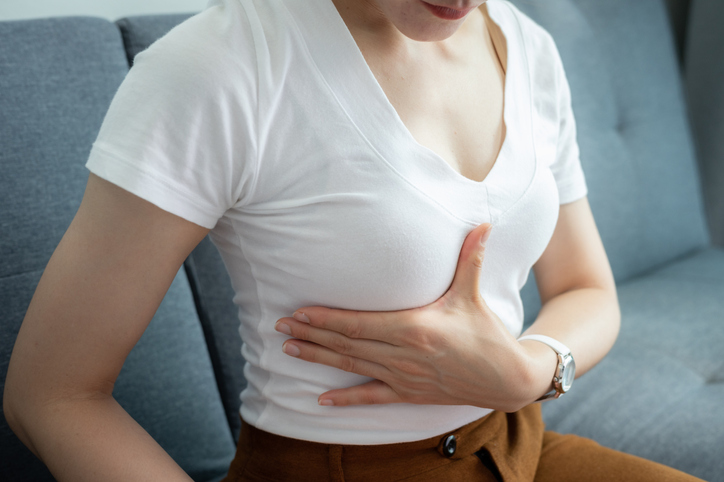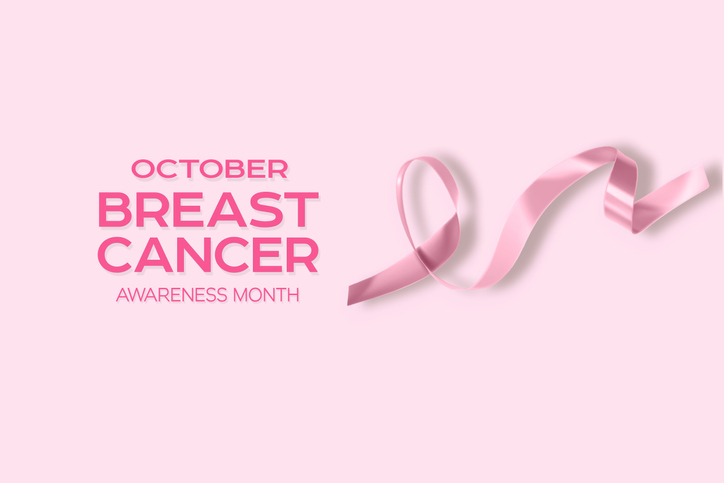Yes, Young Women Too Can Get Breast Cancer.

By Joy Stephenson-Laws, JD, Founder
Many young people are being diagnosed with cancer. I’ve discussed people under 40 getting colon cancer, and, unfortunately, I have read a few recent stories about women in their twenties getting breast cancer.
Take, for example, a woman named Lindsey Parr Gritton. Thirty-six weeks pregnant with her second child and only in her late twenties, Gritton was at a doctor’s appointment. She complained of a lump in her breast that she said was burning, according to this article from People Magazine where Gritton was interviewed.
Always advocate for yourself.Although she was told that it was probably just a clogged duct or mastitis (inflammation in the breast usually caused by a bacterial infection), Gritton insisted that she have an ultrasound.
"I literally saved my own life just by asking for that," Gritton told People.
Turns out she had a very aggressive form of breast cancer. Imagine receiving this devastating news at such a young age just weeks away from giving birth to your second child. Gritton delivered her baby early so that she could start chemotherapy treatments right away. After undergoing a PET scan, she was told that she had only six months to live. The cancer had spread and there were a dozen of tumors present in her liver, according to People.
Many might think this only happens to people who have a family history of breast cancer, however, Gritton shared that there was no history of breast cancer in her family on both her mother and father’s sides.

Fortunately, after treatment and having a lumpectomy (a procedure in which the cancer and some of the surrounding tissue is removed) Gritton’s cancer disappeared. She said her doctor was shocked that she was in remission. Because of her fight and demanding that ultrasound, she lived to see her 30th birthday and her new baby’s first baby. Today she shares her story, because there are many young women going through what she did.
"I wanted to share my story and bring awareness. Everyone thinks breast cancer happens after the age of 40. You don't really think about it happening in your 20s," according to People.
In another story, 29-year-old Philecia La'Bounty felt what she described as a marble when adjusting her sports bra, according to one report from ABC News.
When she went to the doctor she was told it was a benign cyst.
Always ask, and ask again. Don't let people tell you you're too young."I asked for a mammogram. The doctor I was seeing applied to a program for the mammogram. They in return said I was denied due to age. I was too young and had no family history," La'Bounty said according to ABC.
ABC reports that she asked her doctor to apply again for the mammogram (she did not have health insurance and was using a free clinic). She was denied again and told to come see the doctor if the lump grew or became too uncomfortable. She returned eight months later, and the lump had grown to eight centimeters. She finally got that mammogram she asked for, along with other testing, and she was diagnosed with stage 4 breast cancer that had spread to her lungs, lymph nodes and more.
La'Bounty had to undergo very intense treatment. She is now in her mid thirties and in remission, but she has to take oral chemotherapy for the rest of her life. She also shared that she will never be able to have her own children. On the positive side of this, she is a survivor and shares her story to spread awareness. She stresses that if you sense something is wrong, demand what you need until you are happy with the answer.
Why are young women getting breast cancer?This is not the first time I have discussed this issue - It’s Breast Cancer Awareness Month. Young Women Must Also Be Proactive.
According to a recent study published by the Journal of the American Medical Association (JAMA), cancer in general is on the rise in people under the age of 50. This is especially evident in women.
“Breast cancer accounted for the highest number of cancer cases in younger people,” according to a report from the Washington Post that discusses the study.
“The rate of late-stage breast cancer diagnoses in young women also has been climbing.”
Furthermore, “In interviews, young women with breast cancer said they felt dismissed by their doctors when they first raised concerns about their breast health. Now, a growing group of patients and experts are calling for further research and conversations about breast cancer among young women.”
Usually, mammograms are not recommended until the age of 40. I cannot give a definitive answer as to why a young woman might get breast cancer, however, the Cleveland Clinic suggests that some women may have genetic mutations that predispose them. It is also more difficult to diagnose breast cancer in younger women because they tend to have much denser breast tissue than older women. The good news is that more than 90 percent of women who are diagnosed with breast cancer in the early stage and are treated will survive.
“For women with a family history that is suggestive of a hereditary predisposition for breast cancer, a referral for genetic counseling may be appropriate. Identifying such genetic conditions will allow for a more personalized discussion on screening and preventive treatment options. For example, screening in BRCA mutation carriers begins at the age of 25,” reports Cleveland Clinic.
As we have seen from the stories discussed, neither of the women had a family history. I am a huge proponent of genetic testing, because it gives you such power in being proactive. Perhaps testing such as this should be the norm, despite having a family history or not.
(pH must-read - Go pink! Breast cancer gene test may save lives)
I highly recommend reading this article called You Don’t Need a Family History of Cancer to Benefit from Genetic Testing.
Other ways to be proactive.
As with all cancers, it is a good idea to maintain a healthy weight, enjoy physical activity, limit alcohol consumption, avoid smoking and maintain a nutrient-rich diet (eating walnuts may be particularly effective). It is also important to undergo routine nutrient testing in order to determine any nutrient imbalances or deficiencies. Research has shown that nutritional balance is key in preventing and fighting a myriad of chronic illnesses and diseases. If the test reveals a deficiency or imbalance, a competent healthcare professional can work with you regarding making the necessary dietary changes and/or recommend quality supplements.
For more informative blogs about breast cancer, read here. Although rare, men can get breast cancer too.
Enjoy your healthy life!
Disclaimer: This article is not intended to provide medical advice. Please consult with your doctor or another competent healthcare practitioner to get specific medical advice for your situation.
The pH professional health care team includes recognized experts from a variety of health care and related disciplines, including physicians, attorneys, nutritionists, nurses, and certified fitness instructors. This team also includes the members of the pH Medical Advisory Board, which constantly monitors all pH programs, products, and services. To learn more about the pH Medical Advisory Board, click here.







